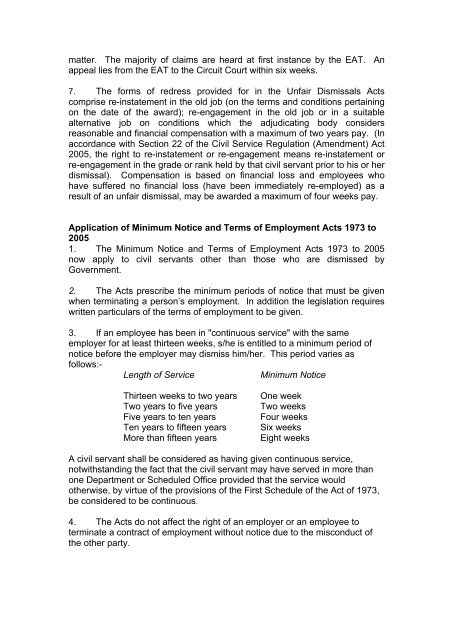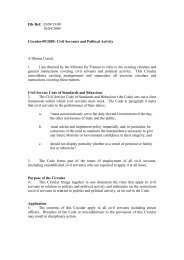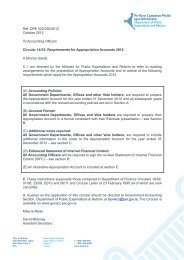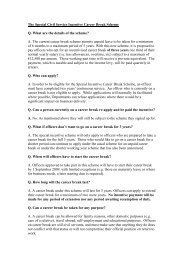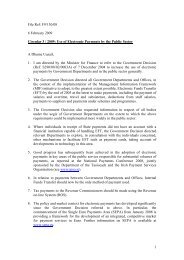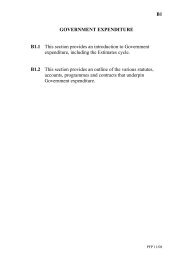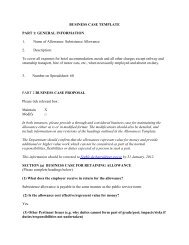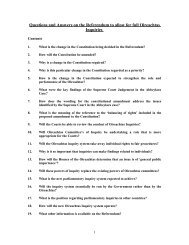Disciplinary Code - Human Resource Management in the Civil Service
Disciplinary Code - Human Resource Management in the Civil Service
Disciplinary Code - Human Resource Management in the Civil Service
You also want an ePaper? Increase the reach of your titles
YUMPU automatically turns print PDFs into web optimized ePapers that Google loves.
matter. The majority of claims are heard at first <strong>in</strong>stance by <strong>the</strong> EAT.appeal lies from <strong>the</strong> EAT to <strong>the</strong> Circuit Court with<strong>in</strong> six weeks.An7. The forms of redress provided for <strong>in</strong> <strong>the</strong> Unfair Dismissals Actscomprise re-<strong>in</strong>statement <strong>in</strong> <strong>the</strong> old job (on <strong>the</strong> terms and conditions perta<strong>in</strong><strong>in</strong>gon <strong>the</strong> date of <strong>the</strong> award); re-engagement <strong>in</strong> <strong>the</strong> old job or <strong>in</strong> a suitablealternative job on conditions which <strong>the</strong> adjudicat<strong>in</strong>g body considersreasonable and f<strong>in</strong>ancial compensation with a maximum of two years pay. (Inaccordance with Section 22 of <strong>the</strong> <strong>Civil</strong> <strong>Service</strong> Regulation (Amendment) Act2005, <strong>the</strong> right to re-<strong>in</strong>statement or re-engagement means re-<strong>in</strong>statement orre-engagement <strong>in</strong> <strong>the</strong> grade or rank held by that civil servant prior to his or herdismissal). Compensation is based on f<strong>in</strong>ancial loss and employees whohave suffered no f<strong>in</strong>ancial loss (have been immediately re-employed) as aresult of an unfair dismissal, may be awarded a maximum of four weeks pay.Application of M<strong>in</strong>imum Notice and Terms of Employment Acts 1973 to20051. The M<strong>in</strong>imum Notice and Terms of Employment Acts 1973 to 2005now apply to civil servants o<strong>the</strong>r than those who are dismissed byGovernment.2. The Acts prescribe <strong>the</strong> m<strong>in</strong>imum periods of notice that must be givenwhen term<strong>in</strong>at<strong>in</strong>g a person’s employment. In addition <strong>the</strong> legislation requireswritten particulars of <strong>the</strong> terms of employment to be given.3. If an employee has been <strong>in</strong> "cont<strong>in</strong>uous service" with <strong>the</strong> sameemployer for at least thirteen weeks, s/he is entitled to a m<strong>in</strong>imum period ofnotice before <strong>the</strong> employer may dismiss him/her. This period varies asfollows:-Length of <strong>Service</strong>M<strong>in</strong>imum NoticeThirteen weeks to two yearsTwo years to five yearsFive years to ten yearsTen years to fifteen yearsMore than fifteen yearsOne weekTwo weeksFour weeksSix weeksEight weeksA civil servant shall be considered as hav<strong>in</strong>g given cont<strong>in</strong>uous service,notwithstand<strong>in</strong>g <strong>the</strong> fact that <strong>the</strong> civil servant may have served <strong>in</strong> more thanone Department or Scheduled Office provided that <strong>the</strong> service wouldo<strong>the</strong>rwise, by virtue of <strong>the</strong> provisions of <strong>the</strong> First Schedule of <strong>the</strong> Act of 1973,be considered to be cont<strong>in</strong>uous.4. The Acts do not affect <strong>the</strong> right of an employer or an employee toterm<strong>in</strong>ate a contract of employment without notice due to <strong>the</strong> misconduct of<strong>the</strong> o<strong>the</strong>r party.


